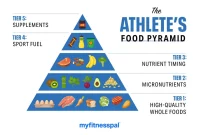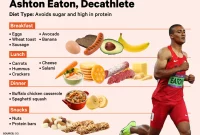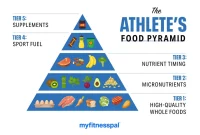The Athlete’s Kitchen: Cooking for Performance
Easy and Nutritious Recipes for Athletes
Athletes require proper nutrition to fuel their bodies for optimal performance. However, finding quick and nutritious meal options can be a challenge. Here are some easy and delicious recipes that are perfect for athletes looking to enhance their performance in the kitchen:
1. Protein-Packed Omelette
Start your day with a protein-packed omelette. Beat together three eggs with your choice of vegetables such as spinach, mushrooms, and bell peppers. Add a source of lean protein like diced turkey or chicken breast. Cook in a non-stick pan until it’s golden and serve it with a side of whole grain toast.
2. Quinoa Salad with Grilled Chicken
For a satisfying and nutritious lunch or dinner, try a quinoa salad with grilled chicken. Cook quinoa according to package instructions and let it cool. Mix it with grilled chicken breast, cherry tomatoes, cucumber, feta cheese, and a drizzle of olive oil and lemon juice. This dish is high in protein and packed with essential vitamins and minerals.
3. Energy-Boosting Smoothie
When you need a quick and refreshing snack, whip up an energy-boosting smoothie. Blend together a frozen banana, a handful of spinach, almond milk, almond butter, and a scoop of protein powder. This smoothie is rich in antioxidants, vitamins, and minerals to fuel your workouts.
4. Baked Salmon with Sweet Potatoes
Salmon is an excellent source of omega-3 fatty acids, which are essential for athletes. To prepare a simple and nutritious dinner, season a salmon fillet with herbs, lemon juice, and olive oil. Bake it in the oven and serve it with roasted sweet potatoes and steamed broccoli. This meal provides a great balance of protein, healthy fats, and complex carbohydrates.
5. Greek Yogurt Parfait
For a post-workout snack or a healthy dessert, indulge in a Greek yogurt parfait. Layer Greek yogurt with your favorite fruits, such as berries and sliced bananas. Add a sprinkle of granola or nuts for some crunch. Greek yogurt is a fantastic source of protein and calcium, essential for muscle recovery and strength development.
By incorporating these easy and nutritious recipes into your meal plan, you can optimize your performance as an athlete. Remember to focus on quality ingredients and balance your macronutrients for peak athletic performance.
Understanding the Glycemic Index in Foods
In the world of sports and athletics, nutrition plays a crucial role in optimizing performance. Athletes are always in search of the perfect balance of nutrients to fuel their workouts and improve their overall achievements.
One important aspect of sports nutrition is understanding the glycemic index (GI) in foods. The GI is a numerical value that measures how quickly carbohydrates in a particular food convert to glucose in the body. This index ranges from 0 to 100, with higher values indicating a faster conversion into glucose.
Foods with a high GI value, such as white bread, sugary cereals, and processed snacks, are quickly digested and absorbed by the body. As a result, they cause a rapid rise in blood sugar levels. While this can provide a quick burst of energy, it is usually short-lived and followed by a crash, leaving athletes feeling sluggish.
On the other hand, foods with a low GI value, like whole grains, legumes, and most fruits and vegetables, are digested and absorbed more slowly. This slow release of glucose into the bloodstream provides a steady and sustained source of energy, which is beneficial for athletes during prolonged physical activities.
It’s also crucial to note that the ideal timing of consuming high or low GI foods varies depending on the type and duration of exercise. Before intense workouts, athletes may benefit from consuming some high GI foods for quick energy. However, during longer endurance activities, it is recommended to consume a combination of both high and low GI foods to ensure a steady energy supply.
By understanding the glycemic index of different foods, athletes can strategically plan their meals and snacks to optimize their performance. It’s important to consult with a nutritionist or sports dietitian to develop a personalized and effective nutrition plan that takes into account individual goals and dietary preferences.
Meal Prepping Tips for Busy Athletes
Meal prepping is an essential practice for busy athletes looking to optimize their performance in the kitchen. By planning and preparing meals in advance, athletes can ensure they have nutritious and balanced meals ready to fuel their training and recovery. Here are some helpful tips to make meal prepping a breeze:
-
Plan your meals:
Start by creating a meal plan for the week. Consider your training schedule and nutritional needs, and design a balanced menu accordingly.
-
Batch cooking:
Cook large batches of proteins such as chicken, lean beef, or fish, as well as grains and starchy vegetables. Divide them into individual portions for easy access throughout the week.
-
Pre-cut and wash veggies:
Spend some time at the beginning of the week washing, chopping, and storing vegetables in containers. This way, they will be readily available for quick meals and snacks.
-
Use quality storage containers:
Invest in good quality containers that are microwave-safe, leak-proof, and stackable. This will make storing and reheating meals a breeze.
-
Pre-portion snacks:
Prepare small bags or containers with healthy snacks such as nuts, seeds, or protein bars. These will come in handy when you need a quick energy boost on the go.
-
Label and organize:
Clearly label your prepped meals and snacks with the date and contents. Keep them organized so you can easily find what you need when hunger strikes.
-
Experiment with flavors:
While meal prepping might sound repetitive, mix things up by incorporating different spices, herbs, and sauces. This will add variety and keep your taste buds satisfied.
By taking the time to meal prep, you can stay consistent with your nutritional goals and save time during busy days. Whether you’re an endurance athlete or a weightlifter, these tips will help you stay fueled and focused on your athletic performance.
The Role of Organic Foods in Sports Nutrition
The Athlete’s Kitchen: Cooking for Performance
Sports nutrition plays a vital role in the performance and overall well-being of athletes. One aspect of sports nutrition that is gaining attention is the role of organic foods. Organic foods have become increasingly popular among athletes due to their potential benefits. These foods are grown without the use of synthetic fertilizers, pesticides, hormones, or antibiotics, making them a healthier choice for athletes.
One reason why organic foods are favored by athletes is their higher nutrient content. Studies have shown that organic fruits and vegetables contain higher levels of vitamins, minerals, and antioxidants compared to conventionally grown produce. These nutrients contribute to improved energy levels, enhanced recovery, and reduced inflammation, all of which are crucial for athletes.
In addition to their nutrient density, organic foods are also free from harmful chemicals. Pesticides commonly used in conventional farming practices have been found to have negative effects on human health. By choosing organic options, athletes can minimize their exposure to these harmful substances and prioritize their overall well-being.
Furthermore, organic foods are beneficial for the environment. Organic farming practices promote soil health and biodiversity, reduce pollution, and conserve water. As athletes, it is important to recognize the impact of our food choices on the planet and strive for sustainability.
It is important to note that while organic foods offer potential benefits for athletes, they should not be the sole focus of a sports nutrition plan. A well-rounded diet that includes a variety of whole foods and meets individual macronutrient and micronutrient needs is essential for optimal performance.
In conclusion, organic foods have a significant role in sports nutrition, providing athletes with higher nutrient content, reduced exposure to harmful chemicals, and environmental sustainability. However, they should be incorporated as part of a balanced diet rather than the sole focus. As athletes, it is important to prioritize nutrition and make informed choices to fuel our bodies for peak performance.
The Impact of Dietary Restrictions on Performance
Diet plays a crucial role in the performance of athletes. The food they consume directly affects their energy levels, stamina, and overall physical and mental performance. In recent years, dietary restrictions have gained popularity among athletes for various reasons.
One of the most common dietary restrictions followed by athletes is the elimination of gluten. Gluten is a protein present in wheat, barley, and rye, which can cause digestive issues and inflammation in some individuals. By cutting out gluten-containing foods, athletes with gluten sensitivity or celiac disease can improve their gut health and enhance nutrient absorption.
Another common dietary restriction is the avoidance of dairy products. Some athletes choose to eliminate dairy due to lactose intolerance, which can cause discomfort, bloating, and digestive issues. Dairy-free diets can also help reduce mucus production, potentially enhancing respiratory function and reducing the risk of sinus and respiratory infections.
Furthermore, some athletes opt for vegetarian or vegan diets, avoiding meat and animal products altogether. Plant-based diets can be rich in essential nutrients, vitamins, and antioxidants, while providing a lower intake of saturated fats. However, careful planning is essential to ensure athletes following these diets meet their protein and vitamin requirements.
Despite the potential benefits, it is important for athletes to approach dietary restrictions with caution. Any drastic or restrictive diet should be carefully monitored to ensure adequate energy intake and nutrient balance. Athletes should work with registered dietitians or sports nutritionists to develop a customized meal plan that meets their specific needs and goals.
In conclusion, dietary restrictions can have a significant impact on an athlete’s performance. Whether it is avoiding gluten, dairy, or adopting a plant-based diet, athletes need to be mindful of their choices and work closely with professionals to ensure they meet their nutritional needs while still fueling their bodies for optimal performance.
Conclusion
In conclusion, the role of nutrition in athletic performance cannot be overstated. By fueling their bodies with the right nutrients, athletes can optimize their performance and enhance their recovery. The athlete’s kitchen serves as an essential tool for athletes to prepare nutritious, performance-focused meals. By incorporating a balanced diet rich in protein, carbohydrates, and essential vitamins and minerals, athletes can give themselves a competitive edge and achieve their goals.




